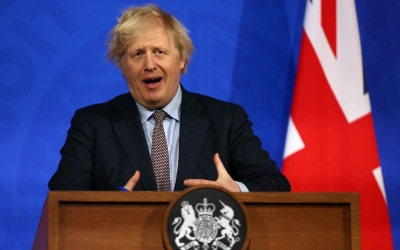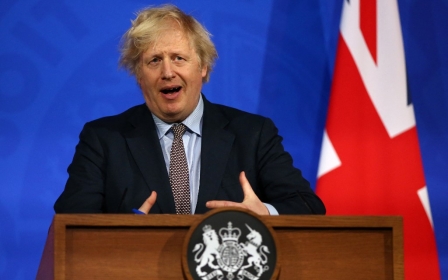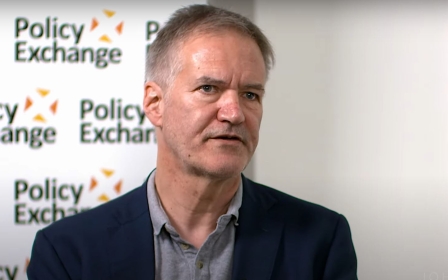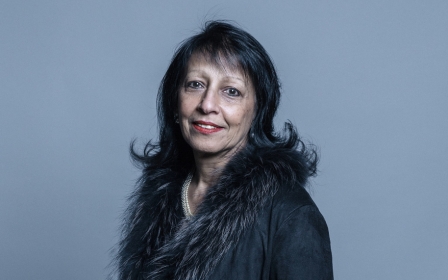New UK counter-extremism head worked for think tank which hosted Islamophobes
A former research fellow at a conservative American think tank that has hosted Islamophobic conspiracy theorists has been appointed head of the British government’s anti-extremism agency.
Robin Simcox, a former research fellow at the Heritage Foundation in Washington DC, has been appointed interim lead at the Commission for Countering Extremism.
Announcing his appointment, initially for six months, the government described the Heritage Foundation as a “renowned” organisation.
Simcox takes over from Sara Khan, who has led the Commission since its inception in 2018.
The UK government website quoted Simcox as saying he looked forward to building on Khan’s work, adding: “Extremism is a scourge that has the potential to impact us all. There can be no place for it in the UK.
New MEE newsletter: Jerusalem Dispatch
Sign up to get the latest insights and analysis on Israel-Palestine, alongside Turkey Unpacked and other MEE newsletters
“I hope to be able to translate my experience in the counter-extremism field into recommendations that can help the government make headway on this key issue.”
The Heritage Foundation has hosted conspiracy theorists such as the activist Frank Gaffney Jr, condemned by the Southern Poverty Law Center as “one of America’s most notorious Islamophobes”, and author Brigitte Gabriel, who has described the Arab world as barbarism.
'Ugly event'
The Washington Post reported on one “ugly” event at the Foundation which saw panellists and audience members round upon one woman in the audience, on the grounds that she was a Muslim.
After leaving the Heritage Foundation Simcox founded a UK-based think tank called the Counter Extremism Group.
He is also a former research fellow at the Henry Jackson Society, a controversial neoconservative think tank that has been accused of stoking Islamophobia.
Simcox has described Islamophobia as a “slippery concept” that can be deployed cynically to shut down argument.
He has also described some critics of the British government’s controversial counter-radicalisation programme, Prevent, as “a hysterical and at times unsavoury” coalition.
The announcement of Simcox’s appointment came on the day that it was disclosed that one member of the panel appointed to investigate Islamophobia within the UK’s ruling Conservative Party has said that the term is being used “to create a modern-day blasphemy law” to protect Islam from criticism.
The same day also saw the publication of a widely criticised report by the Commission on Race and Ethnic Disparities, which was established by the British government to examine inequality in the wake of the Black Lives Matter protests.
Following a series of official reports that highlighted discrimination in the criminal justice system, schools and workplaces, Prime Minister Boris Johnson said in the summer of 2020 that he wanted a report that would "change the narrative so we stop the sense of victimisation and discrimination".
After concluding that most racial disparities were not linked to racism, the report was condemned by politicians and equality campaigners as a “divisive” report that ignored disparities in education, health and housing.
One passage, which spoke of “a new story about the Caribbean experience” in which the slave trade enabled African people to culturally transform themselves, was greeted with particular dismay.
A report 'steeped in denial'
Following publication, the lead author of the report said that the passage was intended to explain that African people maintained their humanity and culture despite the inhumanity of slavery.
However, a former government adviser on race condemned the report as being “steeped in denial” and said it appeared to be aimed at a white, working-class audience.
In recent months the British government has made a series of highly controversial appointments to its equalities watchdog, the Equality and Human Rights Commission. These have included a journalist who supported the government policy of creating a “hostile environment” for immigrants and who says his own children consider him to be racist.
The Commission to be headed by Simcox was established in the wake of a series of five terrorist attacks in Britain in 2017, in which 36 people were killed and scores injured. Attempts were made at that time to criminalise extremism, but government lawyers struggled to form a definition of extremism that would have survived a free-speech challenge in the courts.
Khan, Simcox’s predecessor, faced criticism from some, such as former Conservative Party chair Sayeeda Warsi, who said Khan was not sufficiently respected by enough British Muslims.
Middle East Eye asked the UK Home Office who proposed Simcox for his new role, who appointed him, and who oversaw the process. The Home Office declined to answer MEE's questions.
Middle East Eye delivers independent and unrivalled coverage and analysis of the Middle East, North Africa and beyond. To learn more about republishing this content and the associated fees, please fill out this form. More about MEE can be found here.





